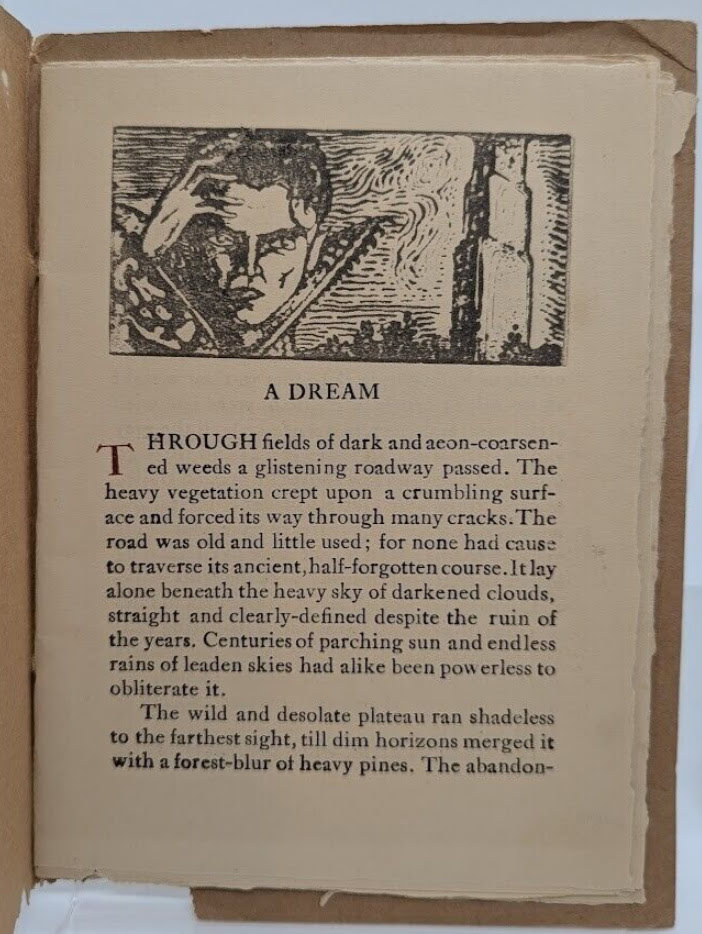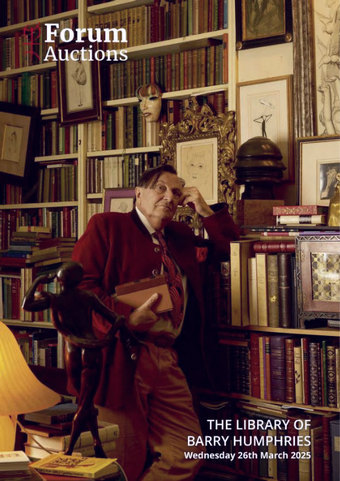HPLinks #57.
* Here in the UK, Edinburgh Napier University newly posts some details of what sounds like an important H.P. Lovecraft Documentary Project which is well underway and about to launch a crowdfunder…
Restoration of archival 16mm footage shot by Sean Martin in 1989/90 about writer H.P. Lovecraft, featuring unique footage of Lovecraft’s then surviving friends and colleagues. Work-in-progress cut was screened at the Lovecraft Centenary Conference at Brown University in 1990. Project received ENU research funding in 2024 to digitise footage. This has now been completed (90 mins of material digitised), and a crowdfunder is being launched in autumn 2025 to raise monies needed to digitise the remaining footage. Industry contacts are in place to assist with restoration and additional postproduction.
* Another ‘Lovecraft as character’ graphic novel, from Argentina, which Deep Cuts usefully reviews this week…
… a story about a boy [Lovecraft] and his cat. It is not a historical work that delves into the nuances of the cultural forces that went into such names, [but rather for those who] want a heartwarming fantasy about Lovecraft and his beloved pet, which has gained a kind of literary immortality.
I found a review from Harartia magazine in Argentina, which concluded the book was… “essential reading for both lovers of horror literature and for those who seek stories that, in their apparent simplicity, hide a moving depth.”
Sounds good. I certainly hadn’t spotted it here, and the news is very welcome. It was published in Argentinia by Jano Comics in 2023, and runs to 103 pages. There’s no sign of it on Amazon or eBay. The closest I can get to a possible store source is AleComics in Buenos Aires, which appears to be selling it locally by mail-order.
* Talking of cats, Grognardia this week considers “The Cats of Ulthar” and points out that… “in its conception of a higher, more mysterious order” of justice, it “stands in marked contrast to the cosmic indifference of Lovecraft’s later, more famous works”. In this sense it shares, I’d add, something with his “The Street”.
* I found a real-life ‘horror story’ from Lovecraft’s uncle Franklin Chase Clark (d. 1915), writing in 1876. Friend’s Review reprinted his survey article in the Sanitarian, on a horrible pig parasite which also infects and quickly kills humans. Eeek!
* The latest Strange Studies of Strange Stories podcast tackles the two ‘most Lovecraftian’ tales of Borges, “There Are More Things” and “The Book of Sand”. It seems the podcast’s Patreons also get a bonus interview with Andrew Leman of the HPLHS.
* A new book chapter on “The Visual Realization of Fantastic Worlds in Book Cover Design”. Now free and open-access, as part of the book Fantasy Aesthetics: Visualizing Myth and Middle Ages, 1880-2020 (2024). This is No. 4 of a German publisher’s The Middle Ages and Popular Culture series, but the text is in English.
* Just published (according to Amazon’s date and reviews, though shipping seems uncertain), the popular culture history book Weirdumentary: Ancient Aliens, Fallacious Prophecies, and Mysterious Monsters from 1970s Documentaries. This comprehensively surveys movies and TV series / specials… “positioned as documentaries, that began with Chariots of the Gods (1970) and ended with The Man Who Saw Tomorrow (1981)”.
* The Hippocampus Press website now has “December” as the shipping date for the forthcoming A Sense of Proportion: The Letters of H.P. Lovecraft and Frank Belknap Long.
* In the related world of R.E. Howard, another fine free audiobook reading from Gates of Imagination, Robert E. Howard’s substantial Solomon Kane tale “The Moon of Skulls”, first published in Weird Tales over two issues in summer 1930. A few years ago Jeffro’s Space Gaming blog was reading through Kane and found that with this tale Kane became… “even more heroic, more imposing, more inspiring, and more awesome than his preceding tales could indicate.” The new reading of “The Moon of Skulls” runs over two hours. There may be frequent ads if you just listen on YouTube, thus an .MP3 download will be far more enjoyable.
* Open Letters Review reviews a new graphic adaptation of “The Tower of the Elephant” by Robert E. Howard. One of my favorite Conan tales, and here paired with art by Valentin Secher. Not really a graphic novel, by the looks of the samples. More of a sumptiously illustrated tale that might work well if paired with an English audiobook reading. At least, it would if you’re someone who doesn’t already have their own very clear visualisation of this classic ‘young Conan the thief’ tale.
The review states the 2022… “Bragelonne original was nearly 11-by-15 inches” and that the new small Titan printing in English is very inferior by comparison. Bragelonne has a page which reveals the French title was Conan illustre : La Tour de l’Elephant, and a title search reveals that Amazon FR and Amazon UK have the same two copies left in stock. Personally, the art really doesn’t fit how I’ve always visualised the tale (too brightly lit, too cliched) or Conan (too old, too steroid-pumped), so the book is not for me. But some collectors may want a big French copy of the book, before they sell out.
* I’m pleased to hear about the second issue of the revived Heavy Metal comics magazine, and the vibes coming from a few trusted HM connoisseurs feel good. My look at the contents-list reveals a new strip by HM veteran Enki Bilal, and even a revival of “The Bus” strip. A reasonable $30 gets you a one year digital subscription to the new quarterly, though sadly it’s a “subscription starts with the current issue” sub. Those only now discovering the HM revival may well want a “start me with issue one” sub, which doesn’t appear to be on offer.
* From Poland, a 2025 B.A. dissertation abstract for “Digital character sheets in RPGs, exemplified by the Call of Cthulhu system”. Not available in full-text. Examines…
… character sheets in role-playing games (RPGs). It also presents the design and implementation of the web application SheetKeep which serves as a virtual character sheet. […] Discusses the history and theory of such, and then] formulates the application’s design requirements. The outcome of this analysis is an application that enables users to create and manage character sheets for the Call of Cthulhu system within their own campaigns.
* And finally, a free HMS Challenger Botanic illustrations LoRA for use as a ‘style plugin’ with Illustrious. Based on scans of Ernst Haeckel’s book, presumably. Lovecraft’s uncle lyrically explains the historical context…
What beauties, what wonders, then, are found miles beneath the sea? The great steamship, the Challenger, sent out for a four years’ cruise by the English Government, has now returned. It has brought back with it the story so long concealed in these darksome and almost fathomless depths; the story of that great and strange and hitherto unknown country stretching for 140,000,000 square miles beneath the dark blue waves.” (Lovecraft’s uncle, Franklin Chase Clark, 1878).
Lovecraft knew and was strongly influenced by Haeckel’s anthropology and philosophy, but if he knew Haeckel as an artist of bizzare marine biology is unknown. The LoRA’s demo images are poor, but I was able to easily generate satisfactory ‘pages’ such as this…
— End-quotes —
“As for sea-food — it is simply intensely repulsive to me. […] From earliest infancy every sort of fish, mollusc, or crustacean has been like an emetic to me.” — Lovecraft on his disgust at the smell of fish out of water, to R.E. Howard, November 1932.
“Miami did not produce much of an impression [but I] sailed out over a neighbouring coral reef in a glass-bottomed boat which allowed one to see the picturesque tropical marine fauna & flora of the ocean floor.” — Lovecraft to Toldridge, July 1931.
The Miami boat… “gave splendid views of the exotic tropical flora and fauna of the ocean floor — grasses, sponges, corals, fishes, sea-urchins, crinoids, etc. A diver went down and brought up a bucket full of sea-urchins for distribution among the passengers, but I restored mine to its native element because I had no means of preserving it.” — Lovecraft to Derleth, June 1931.
“Once I was taken under the ocean in a gigantic submarine vessel with searchlights, and glimpsed some living horrors of awesome magnitude. I saw also the ruins of incredible sunken cities, and the wealth of crinoid, brachiopod, coral, and ichthyic life which everywhere abounded.” — Lovecraft, “The Shadow Out of Time”, written 1934-35.
“[… The madman said] “It is amphibious, you know — you saw the gills in the picture. It came to the earth from lead-grey Yuggoth, where the cities are under the warm deep sea. It can’t stand up in there — too tall — has to sit or crouch.” […] The madman was bidding him hear the splashing of a mythical monster in a tank beyond the door — and now, God help him, he did hear it! […] Phobic paralysis held him immobile and half-conscious, with wild images racing phantasmagorically through his helpless imagination. There was a splashing. There was a padding or shuffling, as of great wet paws on a solid surface. Something was approaching. …” — Lovecraft, “The Horror in the Museum” (written 1933).




























